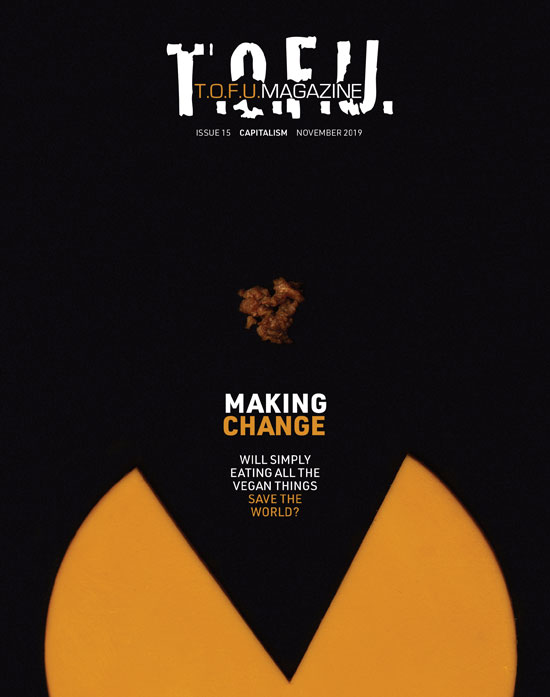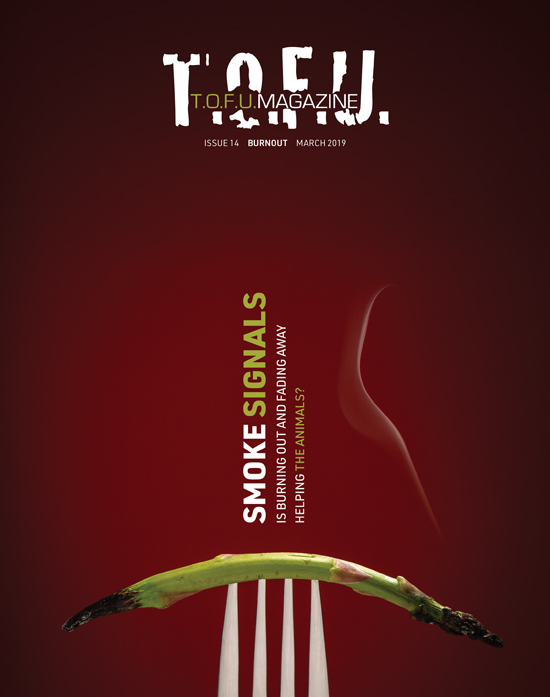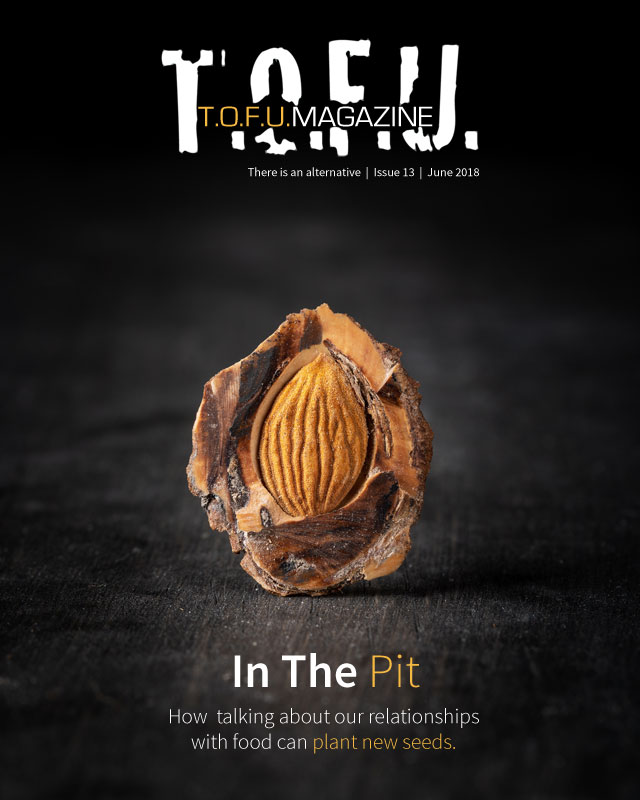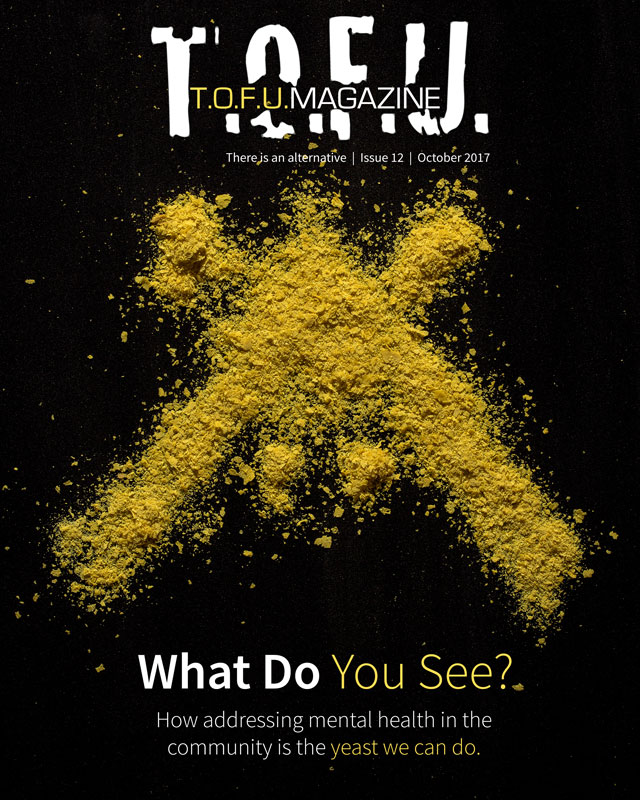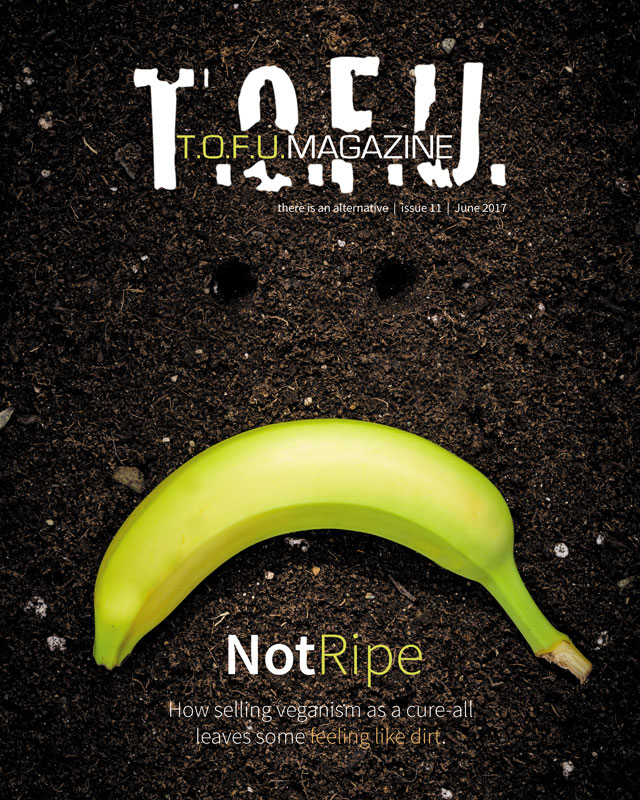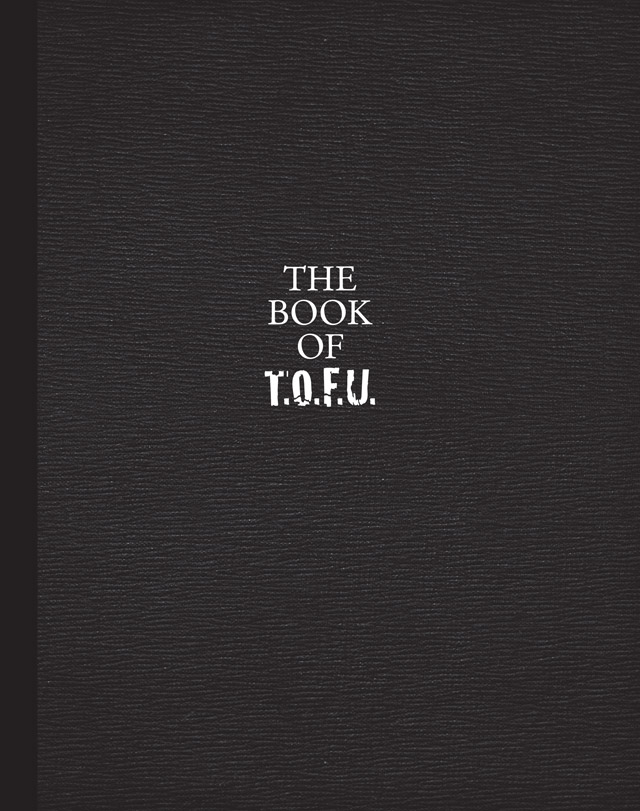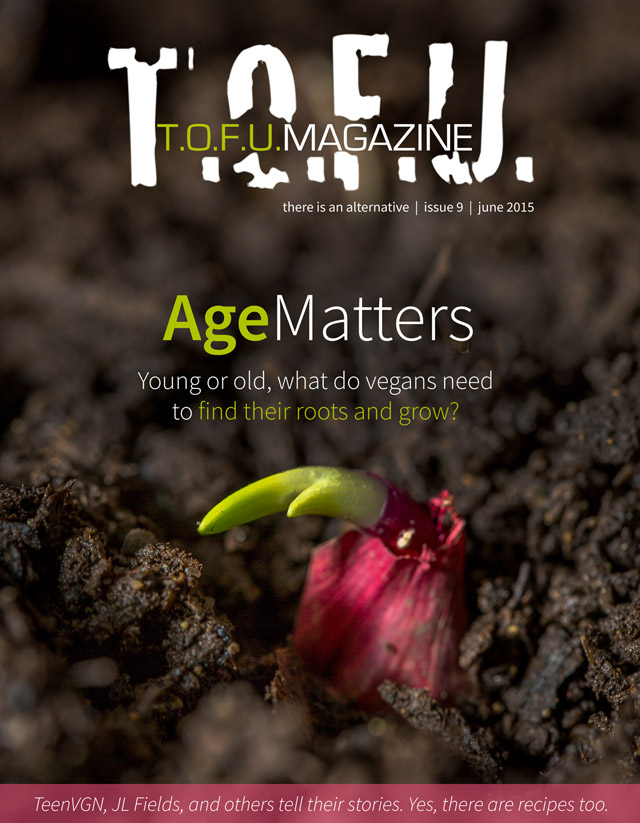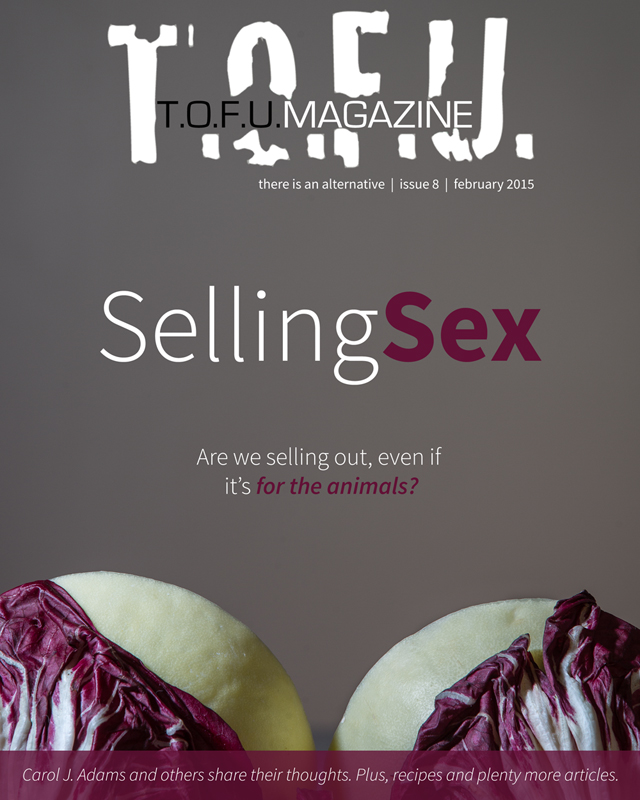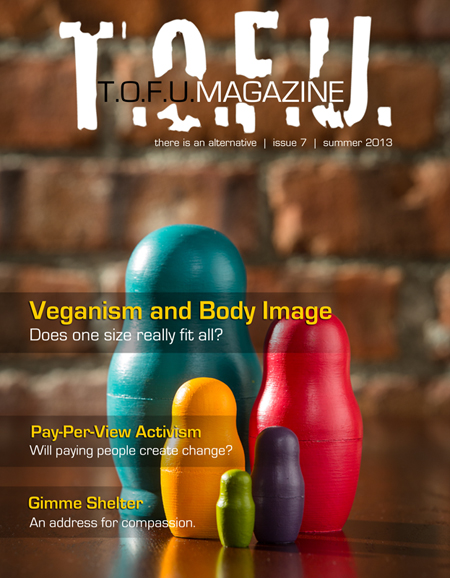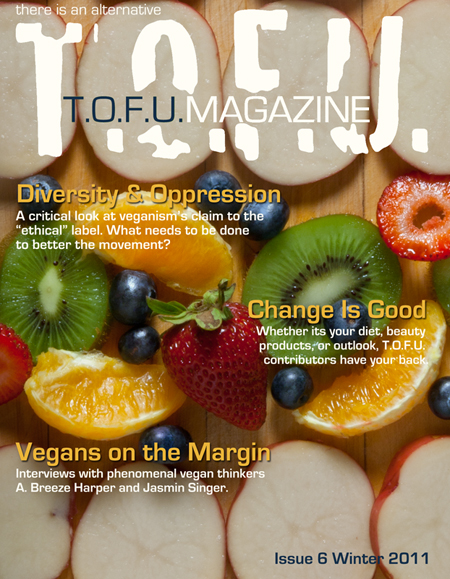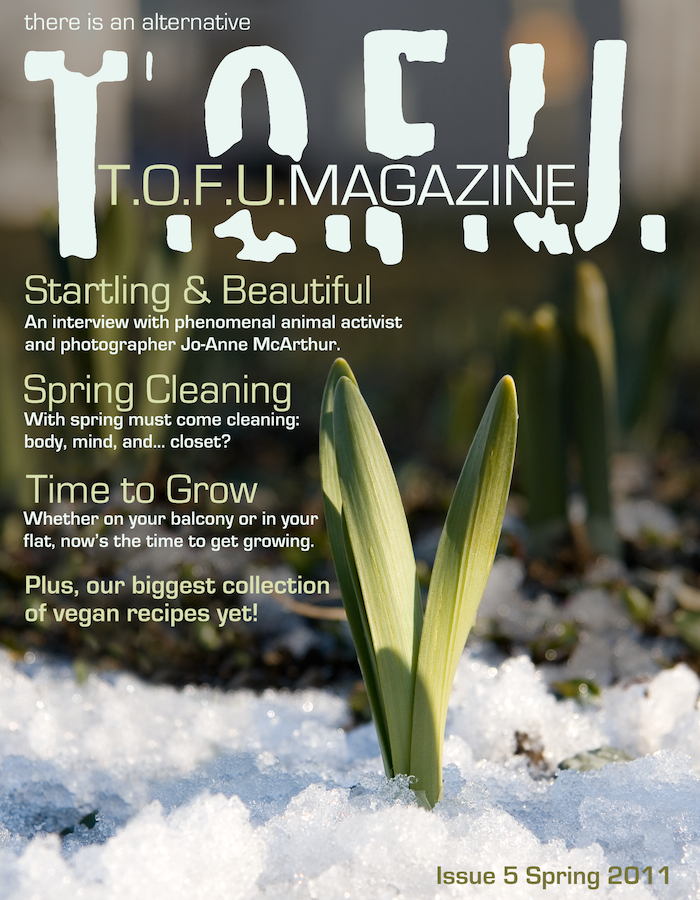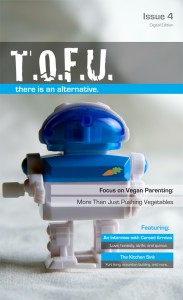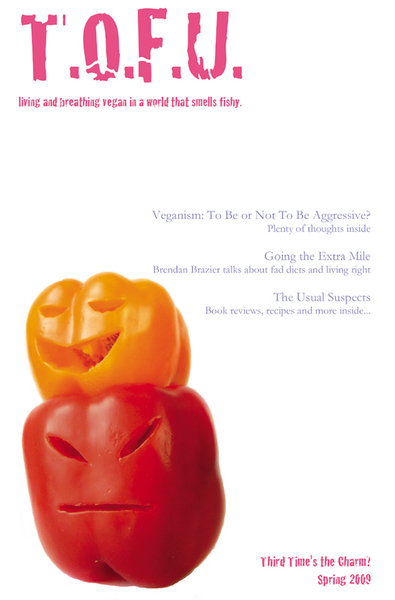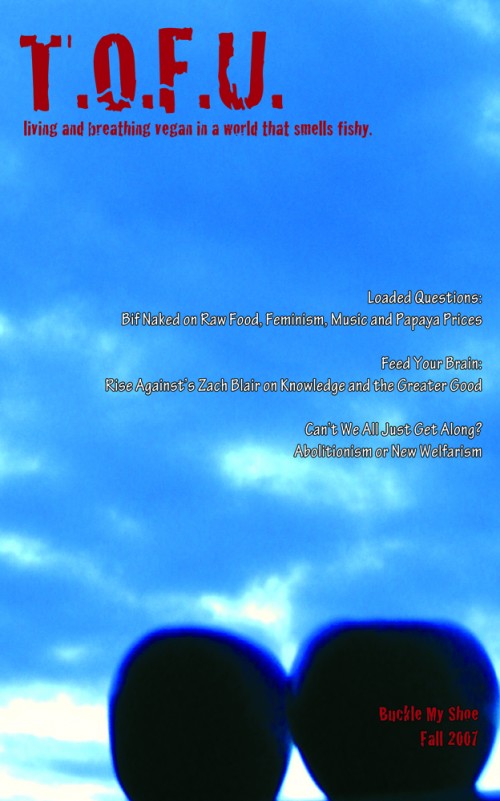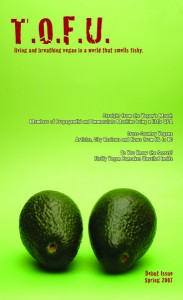TBT | Veganism Is Not An Option
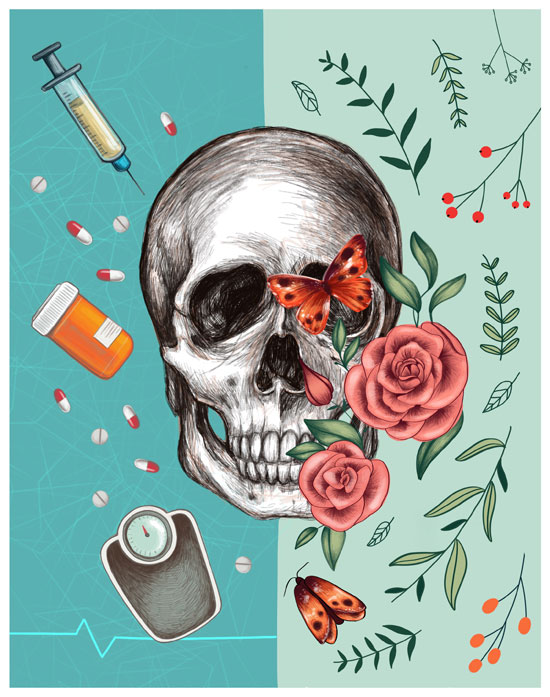
TW: descriptions of eating disorders and hospitals
While I’m still working on rounding-up authors and articles for the next issue, which will focus on burnout, I thought today would be a good time to throwback to the previous issue and one of the many articles that hit hard for me. I knew going in that focusing on disordered eating and veganism would prove to be pretty emotional, but it wasn’t until I started reading the pieces people were submitting that I got a better idea of just how much of a struggle it can be to go through recovery while also trying to hold true to a vegan ethic. Rey’s piece was one of the ones that really spoke to that fight, and I hope by sharing it here that you’re encouraged to read the experiences of the other authors as well. If so, you can download T.O.F.U. #13 here.
Veganism Is Not An Option
Words by Rey Weyler | Illustration by Meneka Repka
I’m privileged in more than one way and absolutely willing to admit it.
One of my privileges has come in the form of my mother. No mother is perfect—and certainly, dealing with a hostile, mentally ill teenager didn’t improve her temperament—but many people in my situation never have the kind of support I’ve received from her. She has, at times, been a pedestal, a cheerleader, and an avid supporter. For example, she was willing to listen to me in ways that treatment providers were not. Since she could see through the eating disorder to who I was/am as a person, she was the only person who defended my veganism and allowed me to remain vegan during various periods of recovery. She knew that I could feel intense empathy for others (including other species), and could see that I did not want to breach my values for recovery. I am so grateful for the role she played in helping my veganism grow to the major aspect of my activism that it is now.
At the age of ten, even with a very supportive mother, I began to struggle with severe depression, low self-esteem, suicidal thoughts and attempts, anxiety, and self harm. Five years later, I began my foray into trying to defeat my own body. I had learned that everything I did was a mistake, that I was stupid for making mistakes, and that I should be shamed for making them. My body was only valuable if it was small. Thus, in the chaos of what felt like an inability to control my ineptitude, I began yo-yo diets, which consisted of mostly self-made starvation diets.
When I turned 16, I became vegan, admittedly at a skewed period of time. The irony, though, is that I did not become vegan to lose weight, to be healthy, or to avoid foods. I had wanted to give up animal products, but held the genuine belief that it was simply too hard. So when I discovered that I could restrict food without too much trouble, I realized animal products were not as important as I’d believed they were.
It’s hard to convince anyone, from my mom to my treatment providers, that this thinking isn’t disordered. I know my eating disorder better than anyone; I’ve lived with it for five years. It still surprises me at times, but I know that my decision to be vegan and stay vegan is not routed in disorder. It doesn’t cause me distress or anxiety. It doesn’t introduce a dichotomy of wanting to forgo animal products vs. wanting to consume them, the way an argument between myself and my eating disorder always does.
Thankfully, even with all of the treatment providers who were against my wish to stay vegan, my mom refused to give up on me as a person. She refused to give up on the extent of my humanity, even in the face of a daunting illness.
Leave Your Values Behind
Depending on where you are in this discussion– that is, if you’ve had an eating disorder or had a loved one with an eating disorder, and you or your loved one is/was vegan, you might know how this goes. If you haven’t, the conversations usually consist of the following:
“We encourage you to eat meat and animal products when you come into treatment because vegetarianism and veganism are often a way to restrict.â€
“I don’t know if I can continue to see you if you aren’t willing to at least be vegetarian.â€
“This program will not permit you to be vegan.â€
“You have to at least eat, you know, cheese, milk, and eggs.â€
“There is a lot of research that suggests that you cannot fully recover from an eating disorder as a vegan.â€
Just the idea of being vegetarian is still seen as so strange and out of the ordinary that this is the way eating disorder treatment is approached– viewing it as something that could not possibly come alongside values. Many treatment providers will not work with you if you are vegetarian, let alone vegan. However, allergies to gluten, dairy, and nuts (even the most mild ones), whether discovered before or during treatment, are accommodated. This is not to say that being vegan or vegetarian is medical in the way that allergies are–but rather, that people can go through treatment and successfully recover with adapted diets.
The last comment eats at me (no pun intended) the most. We barely have good research on patients with anorexia recovering at all, because it is still miserably under-researched. Second of all, in four years in and out of four different facilities specifically for eating disorders, and two not specifically for eating disorders, I have never once met or heard of a single vegan who was recovering or in recovery. I find it hard to believe that somehow, in the small amount of research available on anorexia itself, we have found “a lot†of data on veganism in recovery. And, um, let’s be honest here–how biased do you think that research was?
Don’t get me wrong, I know that veganism can be a form of restriction. I don’t want to deny that or insist that the future of veganism relies on those with eating disorders giving up animal products/ continuing in restrictive veganism–different people need to be in different places to make that choice. I don’t want to invalidate the difficulty of working with dietary restrictions amidst a serious mental illness that revolves around food. I understand the hesitation that treatment providers and centres have in working with veganism—it is harder to have a variety of meals.
However, the thing is that veganism is not inherently restrictive. When everyone around you is eating animal products—for example, when the meals other clients may eat in treatment centres contain animal products—that is when it becomes restrictive. Suddenly, you can’t have a large proportion of snacks or meals that others are being given, but you aren’t cutting out a food group. You aren’t saying, “I won’t eat fat or carbs because they will make me gain weightâ€. You’re just stuck without any options that you would normally choose.
Shamed If You Do, Tube-Fed If You Don’t
What my real issue is here is just how dependent we are on factory farmed animals. When I was in treatment, I had no option but to forgo my veganism for vegetarianism–but we never had meals that were vegan and those who did not follow the vegetarian plan were never made vegan meals. Basically, if it didn’t involve animal products, it wasn’t even a possibility.
With this sort of mentality, both in treatment centres and with health professionals, how do you prove to people that after years of being in and out of treatment centres and being consumed by an eating disorder, giving up animal products is a choice that helps your recovery, rather than hindering it? How do you take in the vegan media where you are shamed for consuming animal products when you are in the hospital and being tube-fed Ensure made with dairy, or having to choose between eating the food they give you, which may have cheese, milk, or eggs, or going back to the tube-feed? How do you consume media when you cannot have discussions about veganism with many of your friends because of the nature of their and your own illnesses?
I have gone into treatment and consumed animal products. Many times. Through this I still considered myself a vegan at heart, and I made vegan choices when I was able. Over the past few years, through navigating debilitating mental illness and ethical choices around food, I learned so much about both mainstream and intersectional veganism, the animal product industry, mental health and mental illness, and also about the systems and patterns of oppression and exploitation that our societies have been built upon. In my recovery, learning about the systems of food production, processing, and consumption, has been incredibly powerful for me. It is information that I have been motivated to seek out by the same values that drive my veganism, which is a passion of love far beyond the obsession of an eating disorder.
Being able to make the changes in my life that I have, especially giving things up or changing the way I do things, has reminded me that I absolutely have control over what I will forgo and what I will not. My eating disorder was rooted in giving up food, giving up calories, as well as sacrificing time to exercise, to reach the level of willpower I saw as so important. To change my body in the way that I thought I wanted. It was driven by the beliefs of a culture that you have to demonstrate willpower over what you enjoy to be a better human–at least when it comes to aesthetics.
But even though in adapting veganism and in learning so much more about the world I have given up animal products and many practices, it is not in any way about my willpower. I have no drive to just quit and eat that cheese pizza. It’s about my values. So for myself, having veganism as a starting point for the things in my life I have changed and want to continue to change allowed me to develop the sense of understanding of where my intentions come from. Having come from a place where, despite loving animals, I blindly accepted the practices of commercially farming them, I have been able to learn that the real challenge to change is often being open to looking at your own viewpoints and beliefs in a new light–being willing to see them as not as good for the planet as they could be. And when you look at just how damaging the human race is to this earth and to itself–don’t we owe it to the planet to be open to change our ideas and our lifestyles, when that is possible?
Alice Walker was the speaker of a quote I read recently with which I immediately fell in love. She said, “Activism is the rent we pay for living on this planet.â€
Being vegan and striving to make vegan choices is a complicated path when you mix it with any kind of disordered eating. Not only did I have to fight it out with some providers, but I now have to be especially careful with my lifestyle and what aspects of culture I let influence my life. I have to be powerful in places where vegan culture means the promotion of starvation “cleanses†and body- negative diets.
Yet now I have a path through my recovery. A purpose. Even the heavy aspects of it have meaning because veganism is more to me than what I choose to eat or wear. It is OK to feel helpless to know there is still something to work towards, with a foundation of who I am and what I care about.
Rey Weyler has been vegan for about five years. They are the proud parent of two rescue horses who they work with at liberty to ensure that their happiness and wellbeing always comes first. Rey also writes a lot of poetry, some related to activist themes and some more based on personal themes.
ig: @reynbowanarchy & @reynbowink | tumblr: @reynbowink
Meneka Repka is an artist and teacher living in Calgary, Alberta, Canada. She holds a PhD in education, and teaches both university and high school courses. She also runs Nooch Greeting Cards, and is a co-founder of VegFest Calgary.
ig: @meneka_repka & @noochgreetingcards

